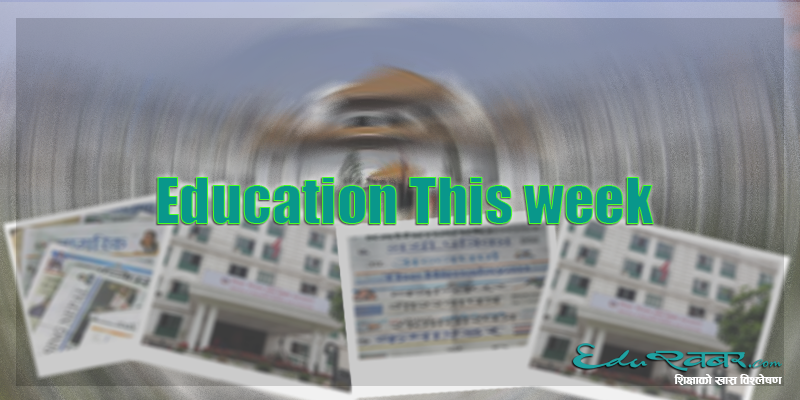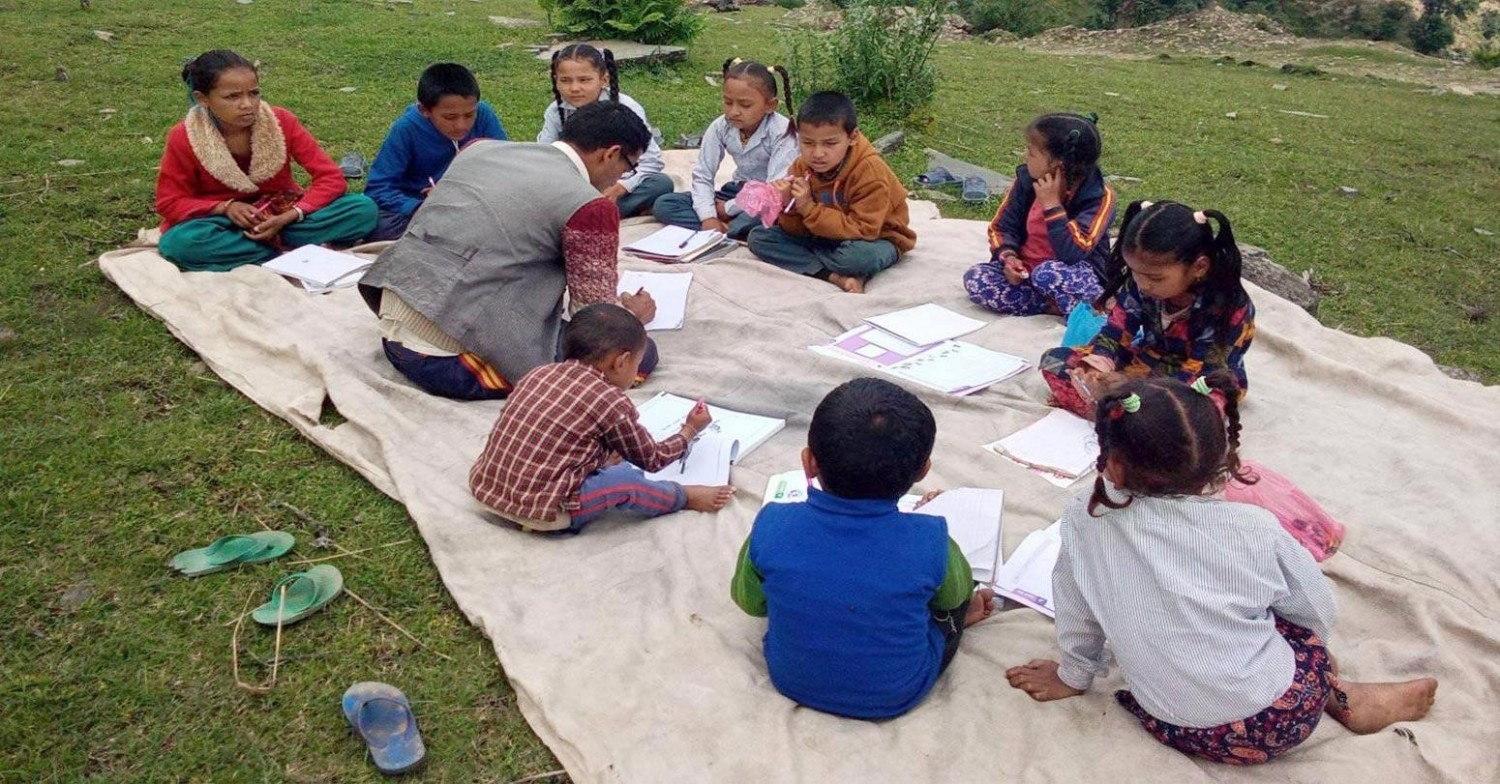
Kathmandu - This festive week news discussed the increased necessity in focusing on technical education, looming uncertainties in the education sector and need for more timely and coordinated government intervention on, some innovative approaches, concern about the loss of public interest in the academic profession.
The government has decided to reopen schools that have remained closed for almost seven months due to COVID Pandemic, reported in the news. Furthermore, MoEST has issued the 'School Reopening Framework 2020' amid concerns from various quarters about the possible loss of current academic session. Similarly, the Government has given the authority to Municipalities to take decisions to resume classes in schools. They have been also entrusted with the responsibility of monitoring if schools are following proper health safety protocols determined by the Government.
Even in the middle of the Pandemic, some schools and colleges in Kathmandu Valley and other local units have already been conducting physical classes following health safety protocols. Those with access to the internet and other resources have been conducting online classes. The government in this instance was late to let Municipalities run the schools.
An opinion stated that the lack of technical knowledge, vocational training and employability skills, or simply lack of technical and vocational education and training (TVET), is one of the reasons for unemployment. It further stated that private sector partnerships, apprenticeships and on-the-job training (OJT) are crucial to match the labour market needs. Council for Technical Education and Vocational Training (CTEVT) launched a TVET public information campaign in February 2020 to create awareness about the benefits of TVET. Due to COVID-19, the campaign moved online to sustain the momentum and has reached almost 4,830,000 social media users. It further stated the need for exploring ways for easy enrollment, free vocational training, and job placement of graduates for productive employment.
A letter to the editor shared concerns about the uncertainty the education sector is facing caused by the Pandemic. It stated that due to the lack of proper coordination between the three levels of Government, only an official declaration of the loss of the present academic year is left to be announced. Due to the lack of cooperation from teachers, local Government agencies education could not be continued in regions without technological access, it stated. The controversy over the new curriculum for class 11 also added to the uncertainties the author stated.
According to the news the Nepal Mathematical Society (NMS) is agitating amid the confusion over whether the new curriculum will be implemented from this academic session while the writ petition filed in the Supreme Court is under consideration. NMS is demanding that mathematics should be compulsory in grade 11.
The Minister for Communications and Information Technology was reported to have directed the Telecommunication Authority of Nepal (TAN) to immediately distribute free SIM cards to all school level students. Similarly, the Ministry for Federal Affairs and General Administration was reported to provide scholarship to 15 students every year to study federalism at Postgraduate level. An agreement in this regard has recently been signed between the Ministry and the School of Management, Kathmandu University (KU).
In the media, the news stated that fewer candidates passed the written examination for the post of Associate Professor in TU than the required positions. It was the same in many departments as fewer applicants passed the exams than the number of vacancies called for. The applicants may not have to give an interview to be selected as is the normal procedure when there are fewer incumbents than the positions. . After the publication of the results by the TU Service Commission (TSC), a debate has started that there is no attraction of capable people to the University and the standard of education may further deteriorated. An Editorial also stated that the way candidates thought of adding their phone number to the answer sheet showed that they were corrupt and useless and were not just fit for University level but not in any educational profession.
This is probably one of the worst core indicators of the direction the education sector is heading today: downhill! Reforms must start here. The government can adopt policies to attract competent people in the teaching job to certain extent by adding with attractive perks. However, this alone is not enough. Although it's not the fault of an individual, unless the society values a teacher it cannot be attractive enough. Teaching is a combination of vocation of an individual and social perception augmented with benefits. This news is certainly worrying if the direction of the society is viewed in the long-term. Price of neglecting education will be paid by society for a long time to come!
 Picture: Those who want they can find ways! Teachers and students of Indrajyoti Basic School in Chhedagaad Municipality-2, Jajarkot district teaching and learning through Tole (neighborhood cluster) Class. Naya Patrika_Mangsir 1_2077.
Picture: Those who want they can find ways! Teachers and students of Indrajyoti Basic School in Chhedagaad Municipality-2, Jajarkot district teaching and learning through Tole (neighborhood cluster) Class. Naya Patrika_Mangsir 1_2077.
A letter-to-the-editor (LTTE) complained that the failure of the government to ensure the continuation of salary to temporary Subject Teachers in the Pandemic has caused injustice to the students and teachers of public schools.
The news on the launch of Educational Information Web Portal for students to find a college, compare courses, fees etc between colleges, their contacts and admission procedures by Study Info Center Pvt. Ltd., a joint venture of Nepali and non-resident Nepali citizens was reported in the media.
A LTTE also expressed concern that the delay of school reopening has led to unemployment of around 5,00,000 private school teachers across the country. The letter also stated that the pandemic affected private school teachers the most. It further recommended that the government should come up with a concrete plan for running schools with a focus on health safety to end the confusion about its opening.
Another LTTE also stated that the culture of rote learning in schools is causing a lack of creative environment in classrooms. It also stated that unless teachers with a sincere interest in the subjects with skills and energy for further research and exploration don’t make to the classrooms, students will not enjoy learning and thus fail to escape from the rote learning culture.
Other news of the week are: Population census and its role in inclusive education; The Far-Western University having its own administration building after decades; non-acceptance of Dalit chairperson of School Management Committee of Shree Basic School in Mechairya Municipality -4, Siraha District by non-Dalits; Government's discriminatory policy against the Madrasas; Actress Manisha Koirala establishing the Cancer Education Fund; Global IME's support to Teach for Nepal; Namkha Rural Municipality of Humla been sealed as 51 students of Mahabaudhha Secondary School tested COVID positive.
'Education this Week' is a joint effort to analyze the press coverage of education in Nepal’s selected print and online media published in Kathmandu. The main aim of this effort is to identify and explain major education issues picked up by the media and give back and foreground of the news. This, we believe, will help policy makers and other responsible people to keep abreast with ongoing concerns and discussions on and around education. EduKhabar, in collaboration with the Center for Educational Policies and Practices (CEPP) , has produced this analysis based on the news printed in Kantipur (Nepali) and The Himalayan Times (English), Dailies and online news portal SetoPati, NayaPatrika and My Republica between 11-17 November, 2020 (26 Kartik – 2 Mangsir, 2077) - Editor.
Read this analysis in Nepali : अनिश्चितता र अलोकप्रिय शिक्षण
प्रतिक्रिया